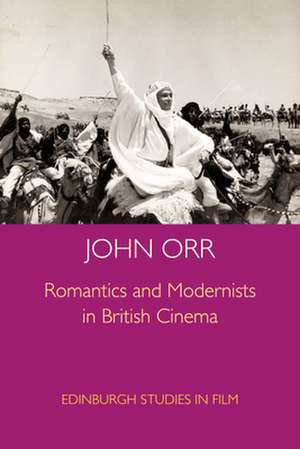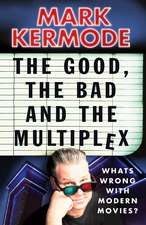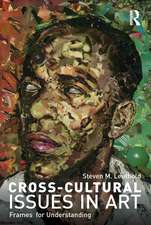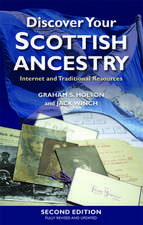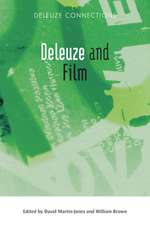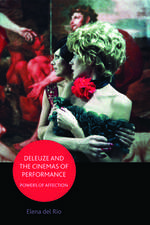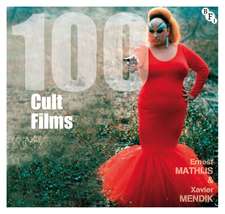Romantics and Modernists in British Cinema: Edinburgh Studies in Film
Autor John Orren Limba Engleză Paperback – 16 feb 2012 – vârsta de la 22 ani
In a fresh and invigorating look at British cinema that considers film as an art form among other arts, John Orr takes a critical look at the intriguing relationship between romanticism and modernism in British cinema.
| Toate formatele și edițiile | Preț | Express |
|---|---|---|
| Paperback (1) | 165.48 lei 3-5 săpt. | |
| EDINBURGH UNIVERSITY PRESS – 16 feb 2012 | 165.48 lei 3-5 săpt. | |
| Hardback (1) | 612.31 lei 6-8 săpt. | |
| EDINBURGH UNIVERSITY PRESS – 31 mar 2010 | 612.31 lei 6-8 săpt. |
Preț: 165.48 lei
Preț vechi: 185.72 lei
-11% Nou
Puncte Express: 248
Preț estimativ în valută:
31.67€ • 33.86$ • 26.40£
31.67€ • 33.86$ • 26.40£
Carte disponibilă
Livrare economică 28 martie-11 aprilie
Preluare comenzi: 021 569.72.76
Specificații
ISBN-13: 9780748649372
ISBN-10: 0748649379
Pagini: 195
Ilustrații: black & white halftones, figures
Dimensiuni: 155 x 231 x 18 mm
Greutate: 0.32 kg
Editura: EDINBURGH UNIVERSITY PRESS
Seria Edinburgh Studies in Film
ISBN-10: 0748649379
Pagini: 195
Ilustrații: black & white halftones, figures
Dimensiuni: 155 x 231 x 18 mm
Greutate: 0.32 kg
Editura: EDINBURGH UNIVERSITY PRESS
Seria Edinburgh Studies in Film
Notă biografică
The late John Orr was Emeritus Professor at the University of Edinburgh and published widely in the areas of modern culture, cinema, theatre and literature. He was also a reviewer for a wide number of periodicals and online journals including Screen, Studies in French Cinema, Film International and Senses of Cinema.
Cuprins
Introduction: Romantics versus Modernists?; 1. 1929: Romantics and Modernists on the Cusp of Sound; 2. The Running Man: Hitchcock's Fugitives and 'The Bourne Ultimatum'; 3. Running Man 2: Carol Reed and his Contemporaries; 4. David Lean: The Troubled Romantic and The End of Empire; 5. The Trauma Film from Romantic to Modern: 'A Matter of Life and Death' to 'Don't Look Now'; 6. Losey and Antonioni: The Expatriate Eye and the Parallax View; 7. Expatriate Eye 2: Kubrick and Skolimowski; 8. Terence Davies and Bill Douglas: The Poetics of Memory; Conclusion: Into the New Century; Bibliography.
Recenzii
Romantics and Modernists retains Orr's characteristic pith and insight. What is more, with unconventional heroism it utterly dispenses with the all the notes, references, quotes and secondary evidences which buttress and clutter many a lesser tome. This is all Orr, crammed with provocative opinion and imaginative flight. It is a gem-like swansong. -- Andrew Moor, Manchester Metropolitan University Journal of British Cinema and Television When Orr is writing about the cinema he clearly loves most (Hitchcock, Reed, Douglas, Davies, McQueen) his own fusing of modernism and romanticism comes to the fore - clear, cogent analysis with an underlying lyricism that inspires an imaginative passion in the reader. -- Nick James Sight and Sound Orr has already written valuable books on Hitchcock's influence and on cinema and modernity. Drawing on these, he traces a dialectic between romanticism and modernism that runs through UK cinema from the beginning of the sound era to the present - often creating a vital tension within its major filmmakers. His themes and juxtapositions are never conventional: chapters on the fugitive 'running man' and the 'trauma film' introduce important new critical perspectives, and his enthusiasms are infectious. Not since Ray Durgnat's A Mirror for England (an acknowledged inspiration) has there been such a stimulating book on cinema in the British Isles. -- Ian Christie, Professor of Film and Media History, Birkbeck, University of London. Author of Arrows of Desire: the Films of Powell and Pressburger and The Art of Film: John Box and Production Design John Orr's book gives the most ambitious single-author overview of British cinema since Raymond Durgnat's ground-breaking A Mirror for England 40 years ago. Not only does Orr offer much that is fresh and illuminating on film-makers ranging from Lean and Reed, through outsiders like Losey and Polanski, to Bill Douglas and Terence Davies, but he places them in a convincing overall perspective. Anyone interested in the riches of Britain's film history will gain from reading it. -- Charles Barr, Emeritus Professor, University of East Anglia Agreeably concise and superbly organised, with a brace of excellent stills to complement the text, this book provides an enjoyable, accessible read while also displaying intellectual rigour and insight. Highly recommended. -- W. W. Dixon, University of Nebraska Choice Romantics and Modernists retains Orr's characteristic pith and insight. What is more, with unconventional heroism it utterly dispenses with the all the notes, references, quotes and secondary evidences which buttress and clutter many a lesser tome. This is all Orr, crammed with provocative opinion and imaginative flight. It is a gem-like swansong. When Orr is writing about the cinema he clearly loves most (Hitchcock, Reed, Douglas, Davies, McQueen) his own fusing of modernism and romanticism comes to the fore - clear, cogent analysis with an underlying lyricism that inspires an imaginative passion in the reader. Orr has already written valuable books on Hitchcock's influence and on cinema and modernity. Drawing on these, he traces a dialectic between romanticism and modernism that runs through UK cinema from the beginning of the sound era to the present - often creating a vital tension within its major filmmakers. His themes and juxtapositions are never conventional: chapters on the fugitive 'running man' and the 'trauma film' introduce important new critical perspectives, and his enthusiasms are infectious. Not since Ray Durgnat's A Mirror for England (an acknowledged inspiration) has there been such a stimulating book on cinema in the British Isles. John Orr's book gives the most ambitious single-author overview of British cinema since Raymond Durgnat's ground-breaking A Mirror for England 40 years ago. Not only does Orr offer much that is fresh and illuminating on film-makers ranging from Lean and Reed, through outsiders like Losey and Polanski, to Bill Douglas and Terence Davies, but he places them in a convincing overall perspective. Anyone interested in the riches of Britain's film history will gain from reading it. Agreeably concise and superbly organised, with a brace of excellent stills to complement the text, this book provides an enjoyable, accessible read while also displaying intellectual rigour and insight. Highly recommended.
